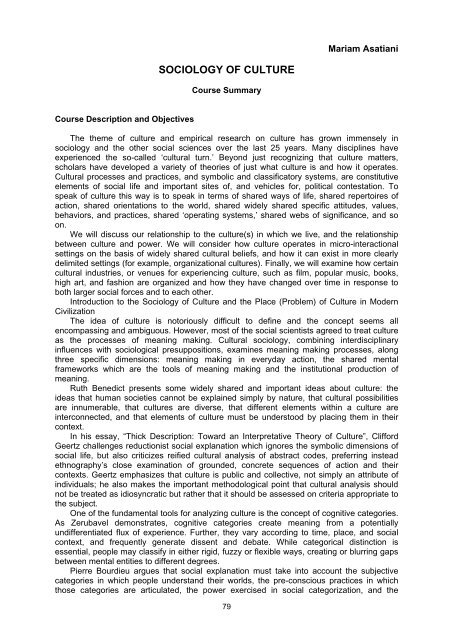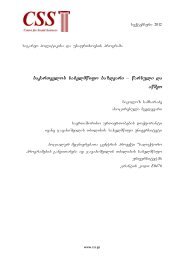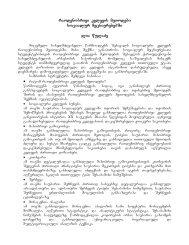Tanamedrove sazogadoeba - Center for Social Sciences
Tanamedrove sazogadoeba - Center for Social Sciences
Tanamedrove sazogadoeba - Center for Social Sciences
Create successful ePaper yourself
Turn your PDF publications into a flip-book with our unique Google optimized e-Paper software.
Mariam Asatiani<br />
SOCIOLOGY OF CULTURE<br />
Course Summary<br />
Course Description and Objectives<br />
The theme of culture and empirical research on culture has grown immensely in<br />
sociology and the other social sciences over the last 25 years. Many disciplines have<br />
experienced the so-called ‘cultural turn.’ Beyond just recognizing that culture matters,<br />
scholars have developed a variety of theories of just what culture is and how it operates.<br />
Cultural processes and practices, and symbolic and classificatory systems, are constitutive<br />
elements of social life and important sites of, and vehicles <strong>for</strong>, political contestation. To<br />
speak of culture this way is to speak in terms of shared ways of life, shared repertoires of<br />
action, shared orientations to the world, shared widely shared specific attitudes, values,<br />
behaviors, and practices, shared ‘operating systems,’ shared webs of significance, and so<br />
on.<br />
We will discuss our relationship to the culture(s) in which we live, and the relationship<br />
between culture and power. We will consider how culture operates in micro-interactional<br />
settings on the basis of widely shared cultural beliefs, and how it can exist in more clearly<br />
delimited settings (<strong>for</strong> example, organizational cultures). Finally, we will examine how certain<br />
cultural industries, or venues <strong>for</strong> experiencing culture, such as film, popular music, books,<br />
high art, and fashion are organized and how they have changed over time in response to<br />
both larger social <strong>for</strong>ces and to each other.<br />
Introduction to the Sociology of Culture and the Place (Problem) of Culture in Modern<br />
Civilization<br />
The idea of culture is notoriously difficult to define and the concept seems all<br />
encompassing and ambiguous. However, most of the social scientists agreed to treat culture<br />
as the processes of meaning making. Cultural sociology, combining interdisciplinary<br />
influences with sociological presuppositions, examines meaning making processes, along<br />
three specific dimensions: meaning making in everyday action, the shared mental<br />
frameworks which are the tools of meaning making and the institutional production of<br />
meaning.<br />
Ruth Benedict presents some widely shared and important ideas about culture: the<br />
ideas that human societies cannot be explained simply by nature, that cultural possibilities<br />
are innumerable, that cultures are diverse, that different elements within a culture are<br />
interconnected, and that elements of culture must be understood by placing them in their<br />
context.<br />
In his essay, “Thick Description: Toward an Interpretative Theory of Culture”, Clif<strong>for</strong>d<br />
Geertz challenges reductionist social explanation which ignores the symbolic dimensions of<br />
social life, but also criticizes reified cultural analysis of abstract codes, preferring instead<br />
ethnography’s close examination of grounded, concrete sequences of action and their<br />
contexts. Geertz emphasizes that culture is public and collective, not simply an attribute of<br />
individuals; he also makes the important methodological point that cultural analysis should<br />
not be treated as idiosyncratic but rather that it should be assessed on criteria appropriate to<br />
the subject.<br />
One of the fundamental tools <strong>for</strong> analyzing culture is the concept of cognitive categories.<br />
As Zerubavel demonstrates, cognitive categories create meaning from a potentially<br />
undifferentiated flux of experience. Further, they vary according to time, place, and social<br />
context, and frequently generate dissent and debate. While categorical distinction is<br />
essential, people may classify in either rigid, fuzzy or flexible ways, creating or blurring gaps<br />
between mental entities to different degrees.<br />
Pierre Bourdieu argues that social explanation must take into account the subjective<br />
categories in which people understand their worlds, the pre-conscious practices in which<br />
those categories are articulated, the power exercised in social categorization, and the<br />
79
















